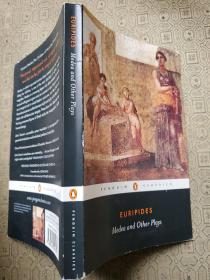
Medea and Other Plays:Medea 英文原版 欧里庇得斯:美狄亚和其他戏剧
¥ 69 8.7折 ¥ 79 九五品
库存2件
作者Euripides
出版社penguin uk
ISBN9780140441291
出版时间2004-08
印刷时间2004-08
印数1千册
装帧平装
开本32开
纸张轻型纸
页数208页
字数1千字
定价79元
上书时间2024-04-13
- 最新上架
商品详情
- 品相描述:九五品
- 商品描述
-
基本信息
Format:Paperback | 208 pages
Dimensions:129 x 198 x 12mm | 157g
Publication date:26 Jul 1973
Publisher:Penguin Books Ltd
Imprint:PENGUIN CLASSICS
Language:English
页面参数仅供参考,具体以实物为准
内容简介
Four plays which exemplify his interest in flawed, characters who defy the expectations of Greek society
The four tragedies collected in this volume all focus on a central character, once powerful, brought down by betrayal, jealousy, guilt and hatred. The first playwright to depict suffering without reference to the deity, Euripides made his characters speak in human terms and face the consequences of their actions. In Medea, a woman rejected by her lover takes hideous revenge by murdering the children they both love, and Hecabe depicts the former queen of Troy, driven mad by the prospect of her daughter's sacrifice to Achilles. Electra portrays a young woman planning to avenge the brutal death of her father at the hands of her mother, while in Heracles the hero seeks vengeance against the evil king who has caused bloodshed in his family. Philip Vellacott's lucid translation is accompanied by an introduction, which discusses the literary background of Classical Athens and examines the distinction between instinctive and civilized behaviour.
For more than seventy years, Penguin has been the leading publisher of classic literature in the English-speaking world. With more than 1,700 titles, Penguin Classics represents a global bookshelf of the best works throughout history and across genres and disciplines. Readers trust the series to provide authoritative texts enhanced by introductions and notes by distinguished scholars and contemporary authors, as well as up-to-date translations by award-winning translators.
古希腊三大悲剧之一。作者欧里庇得斯是“古希腊三大悲剧大师”之一。歌剧讲述了远古时期英雄时代,曾盗取“金羊毛”的英雄伊阿宋抛弃妻儿后妻子美狄亚的悲剧故事。
美狄亚被认为是世界上*感人的悲剧之一,美狄亚被称为戏剧史上*感人的女人之一。我想,当他们读着美狄亚的凄婉诗句,想象着孩子们在她怀里奔流的热血时,几乎没有人能否认他们的心为这个伟大的女人而颤抖。
作者简介
About the Author
Euripides was an Athenian born in 484BC. A member of a family of considerable rank, he disliked performing the public duties expected of him, preferring a life of introspection. He was not a popular figure, and at some point (and for a reason unknown) he went into voluntary exile at the court of Archelaus, King of Macedon. He died c.407BC and is thought to have written around ninety-two plays, of which seventeen survive.
欧里庇得斯(约公元前480 - 406年)是希腊三大悲剧作家之一。出身贵族。据说,现存的“美狄亚”、“希波吕图斯”、“特洛伊安女人”、“阿尔塞斯特”等18部悲剧,共90多部。虽然大部分的戏剧都是基于神话的,但它们都侧重于表达自由人民的思想和感情,这使得神话主题具有了现实意义,广泛地反映了雅典奴隶主民主政治危机深化过程中的许多现实问题。公元前431年左右,美狄亚完成了他的代表作《美狄亚》。该剧以美狄亚的复仇心理为主线,对女性的卑微地位和不幸遭遇表达了深切的同情。它是古希腊悲剧的代表作之一。他的戏剧语言接近于口语,尤其擅长描写人物心理,充满浪漫情调和滑稽气氛,对后世的剧作家产生了很大的影响。
相关推荐
-

Medea and Other Plays
九品株洲
¥ 64.00
-

Medea and Other Plays
九品蚌埠
¥ 27.00
-

Medea and Other Plays
九五品北京
¥ 48.00
-

Medea and Other Plays
八五品重庆
¥ 10.00
-

Medea and Other Plays (Penguin Classics)
九品昆明
¥ 58.00
-

Euripides Medea and Other Plays(英文原版)
八五品武汉
¥ 25.00
-

Medea and Other Plays (Penguin Classics) 美狄亚和其他戏剧
八五品菏泽
¥ 50.00
-

欧里庇得斯:美狄亚及其他剧作Medea and Other Plays (Penguin Classics)
九品鄂州
¥ 50.00
-

Euripides Medea and other Plays 英文原版《欧里庇得斯:美狄亚和其他戏剧》
八五品北京
¥ 40.00
-

Medea and Other Plays 美狄亚和其他戏剧 欧里庇得斯 牛津世界经典系列
九五品成都
¥ 88.00
— 没有更多了 —

















以下为对购买帮助不大的评价